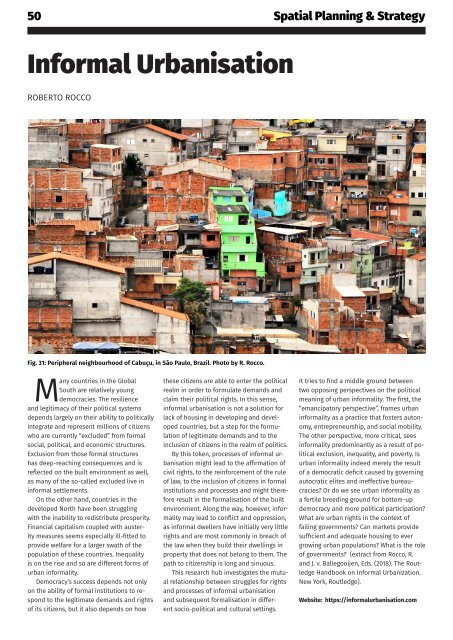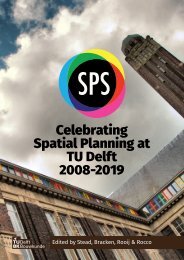*Celebrating Spatial Planning at TU Delft: 2008-2019. Edited by Stead, Bracken, Rooij & Rocco
This is a summary of the achievements of the session Spatial Planning & Strategy of the Department of Urbanism, Faculty of Architecture and the Built Environment, TU Delft, led by Professor Vincent Nadin between 2008 and 2019.
This is a summary of the achievements of the session Spatial Planning & Strategy of the Department of Urbanism, Faculty of Architecture and the Built Environment, TU Delft, led by Professor Vincent Nadin between 2008 and 2019.
Create successful ePaper yourself
Turn your PDF publications into a flip-book with our unique Google optimized e-Paper software.
50 <strong>Sp<strong>at</strong>ial</strong> <strong>Planning</strong> & Str<strong>at</strong>egy<br />
Informal Urbanis<strong>at</strong>ion<br />
ROBERTO ROCCO<br />
Fig. 31: Peripheral neighbourhood of Cabuçu, in São Paulo, Brazil. Photo <strong>by</strong> R. <strong>Rocco</strong>.<br />
Many countries in the Global<br />
South are rel<strong>at</strong>ively young<br />
democracies. The resilience<br />
and legitimacy of their political systems<br />
depends largely on their ability to politically<br />
integr<strong>at</strong>e and represent millions of citizens<br />
who are currently “excluded” from formal<br />
social, political, and economic structures.<br />
Exclusion from those formal structures<br />
has deep-reaching consequences and is<br />
reflected on the built environment as well,<br />
as many of the so-called excluded live in<br />
informal settlements.<br />
On the other hand, countries in the<br />
developed North have been struggling<br />
with the inability to redistribute prosperity.<br />
Financial capitalism coupled with austerity<br />
measures seems especially ill-fitted to<br />
provide welfare for a larger sw<strong>at</strong>h of the<br />
popul<strong>at</strong>ion of these countries. Inequality<br />
is on the rise and so are different forms of<br />
urban informality.<br />
Democracy’s success depends not only<br />
on the ability of formal institutions to respond<br />
to the legitim<strong>at</strong>e demands and rights<br />
of its citizens, but it also depends on how<br />
these citizens are able to enter the political<br />
realm in order to formul<strong>at</strong>e demands and<br />
claim their political rights. In this sense,<br />
informal urbanis<strong>at</strong>ion is not a solution for<br />
lack of housing in developing and developed<br />
countries, but a step for the formul<strong>at</strong>ion<br />
of legitim<strong>at</strong>e demands and to the<br />
inclusion of citizens in the realm of politics.<br />
By this token, processes of informal urbanis<strong>at</strong>ion<br />
might lead to the affirm<strong>at</strong>ion of<br />
civil rights, to the reinforcement of the rule<br />
of law, to the inclusion of citizens in formal<br />
institutions and processes and might therefore<br />
result in the formalis<strong>at</strong>ion of the built<br />
environment. Along the way, however, informality<br />
may lead to conflict and oppression,<br />
as informal dwellers have initially very little<br />
rights and are most commonly in breach of<br />
the law when they build their dwellings in<br />
property th<strong>at</strong> does not belong to them. The<br />
p<strong>at</strong>h to citizenship is long and sinuous.<br />
This research hub investig<strong>at</strong>es the mutual<br />
rel<strong>at</strong>ionship between struggles for rights<br />
and processes of informal urbanis<strong>at</strong>ion<br />
and subsequent formalis<strong>at</strong>ion in different<br />
socio-political and cultural settings.<br />
It tries to find a middle ground between<br />
two opposing perspectives on the political<br />
meaning of urban informality. The first, the<br />
“emancip<strong>at</strong>ory perspective”, frames urban<br />
informality as a practice th<strong>at</strong> fosters autonomy,<br />
entrepreneurship, and social mobility.<br />
The other perspective, more critical, sees<br />
informality predominantly as a result of political<br />
exclusion, inequality, and poverty. Is<br />
urban informality indeed merely the result<br />
of a democr<strong>at</strong>ic deficit caused <strong>by</strong> governing<br />
autocr<strong>at</strong>ic elites and ineffective bureaucracies?<br />
Or do we see urban informality as<br />
a fertile breeding ground for bottom-up<br />
democracy and more political particip<strong>at</strong>ion?<br />
Wh<strong>at</strong> are urban rights in the context of<br />
failing governments? Can markets provide<br />
sufficient and adequ<strong>at</strong>e housing to ever<br />
growing urban popul<strong>at</strong>ions? Wh<strong>at</strong> is the role<br />
of governments? (extract from <strong>Rocco</strong>, R.<br />
and J. v. Ballegooijen, Eds. (2018). The Routledge<br />
Handbook on Informal Urbaniz<strong>at</strong>ion.<br />
New York, Routledge).<br />
Website: https://informalurbanis<strong>at</strong>ion.com




